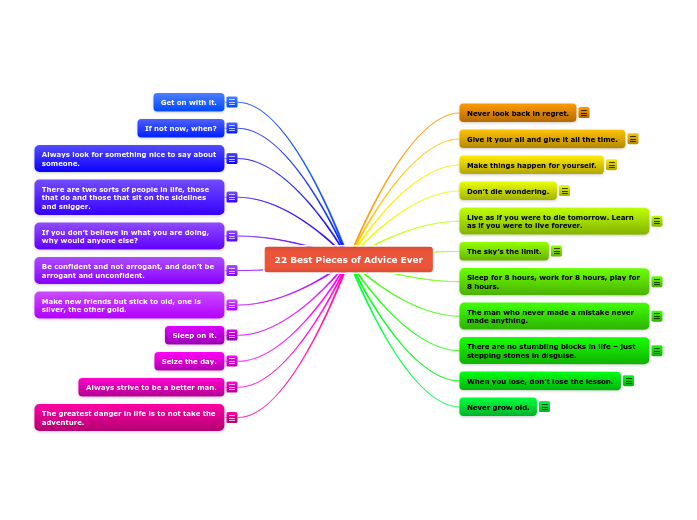Where to next?
Once you have completed mind map, you can use it to:
- Manage your brainstorming session, sharing the information and process with participants
- Capture ideas into the map, then rearrange and evaluate them
- Follow up on the actions and keep your team informed
Share your mind map with other team members to keep them informed about the following actions to be taken.
Brainstorming Session Name
Type in the name or subject of your brainstorming
Toolbox
Subtopic
Process
Move to action
If your session has generated some worthwhile directions, set out the next actions.
- Developing ideas further
- Feasibility studies
- Obtaining support from other stakeholders
- Detailed design
- Prototypes or wireframe mockups
- Trials and tests
Evaluate ideas
Now you can start to filter ideas against your criteria, and use the criteria to improve them.
Add notes with your observations.
Set minimum criteria
Criterion
Add a criterion or requirement against which you will filter and score ideas.
Think about:
- Performance, must-have or must-do factors
- Investment, costs, resources, timescales or other constraining factors
- Feasibility
- Alignment with strategy
- Acceptable risk levels
Incubate ideas
New idea
Give participants some time to reflect on the ideas generated, before evaluating them. New ideas and insights can arise after some time away from the session.
Type them in.
Combine and build on ideas
Observation
Without evaluating or judging, build upon the ideas from other people, using them as triggers for different ideas.
Type in your observations.
Organise and group ideas
Related ideas
Group similar or related ideas together. Look for emerging patterns and gaps created by patterns.
Gather ideas
Rules
Do not prioritize or evaluate ideas when gathering them. Do not suppress ideas because they are too strange or obscure.
Add notes with the rules of your brainstorming session.
Personal brainstorming
Idea
Give participants some time to come up with individual ideas. These can often get lost in group discussions.
Type in their ideas.
Incubate the problem
Feedback
Give participants some time to think about the problem. Initial reactions can often change after some incubation time.
Type in their feedback.
Brief the team
Information
Brief the team on:
1. The objective for this session
2. The time constraints
3. The scenario
4. The contingency plan
5. The process that you will be following, and the rules at each stage.
Contingency plan
Action
Add an action to the contingency plan. Identify the results that the contingency plan will lead to.
Team
Member
Add a team member for this brainstorming session.
- You may need someone to write up the ideas
- You will need someone to lead the group
- A group size of 5 to 7 is ideal
- A mix of backgrounds and knowledge will work better than a group of people who all think along similar lines
- People who are willing to question assumptions are just as valuable as people with field expertise
Scenario
Description
Add a line describing the scenario
Some of your participants may already understand it, and some may not. Both positions are useful.
Explain the special features of the situation that need inventive ideas. Challenge your participants.
Time constraints
Time allowed
Time allowance
How many sessions will there be and how much time do you allow per session?
Objective
State a specific objective for your session. Make sure your objective includes follow-through and actions.
Common objectives include:
- Creating something new
- Solving a problem
- Maximising an opportunity









